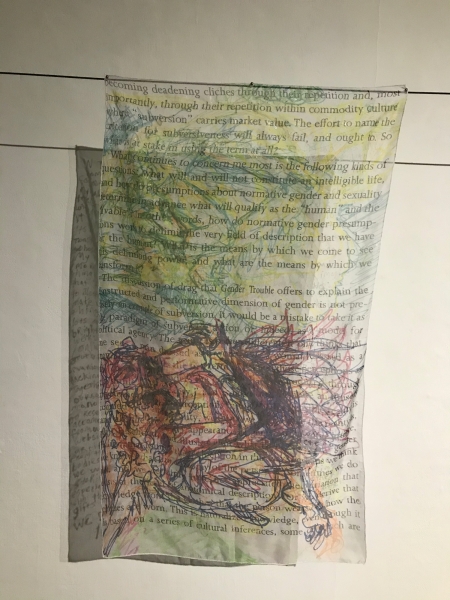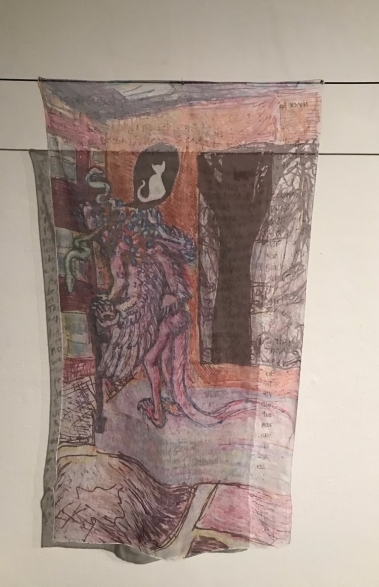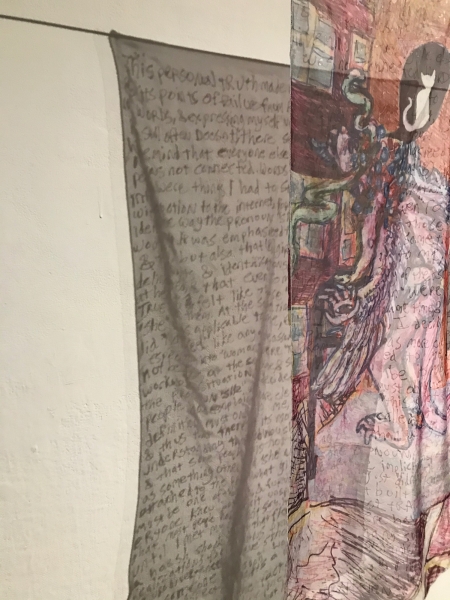Esoterica/Ethos: Critique; for personal use when editing the work of others-
Abstract;
my experiences are complex and alien, and thus my voice is complex and alien; i am excruciatingly aware that many contexts cannot support the weight of that alienness, and thus i often shave off my idiosyncratic edges to accommodate the access of others, as necessary. in my personal writing, i do not make this sacrifice. my personal writing is complex and alien. Thus, my personal writing is hard is hard to read. i have allowed it to remain hard to read.
1)

i am *not* a prescriptivist; i am more of a descriptivist, but i am not *really* one of those either.
2)

i believe that the technical aspects of writing, such as grammar, are tools intended to do the work of conveying meaning to a reader; i believe that there are multiple kinds of reader, and that all of them will bring different needs and experiences and interests to their practice of readership; i believe that the technical aspects of writing are growing and flexible things, that they are never static, and that recorded strictures of their use are necessary, but that such strictures are also ossifications, always a step behind the alive-things as they move between the spaces of our interactions, and so that to replace the living entities with ossified strictures is to remove the source and potential of their continued vitality; i believe that language and grammar, and the control of one's voice more broadly, have long been tools of violence and oppression, and that to address that brutal history, we must actively make room for multiple ways of being and writing and speaking; i believe that 'universal' and 'singular' have limited applications, and that there is no one 'true' or correct form of writing –– rather, there are multiple ways of writing, and vastly different contexts may require vastly different modes and styles to adequately address their needs; i believe that specific technical and conceptual features of writing, from vocabulary and grammar to the use of literary devices and rhetoric, are tools and *only* tools –– they are deployed to make the thing happen, they are neither the thing itself nor the appropriate universal goal –– they are invoked to call the thing to fruition, and if they do not meet that need, then either old forms need to be uncovered/reinvented, or what exists need to be changed/added to; i believe there are both different levels of need and different kinds of taste, and that there is no form of writing that is universally accessible to every reader, and that what one reader finds unbelievably dense and opaque, another might find as vital and refreshing as air, and further that neither of these readers are *correct* and that they both deserve to be served; i believe that other approaches to the technicalities of writing are *as valid as mine* and *do not supercede mine*, and thus i recognize that my style of writing and editing is not appropriate for every audience –– should the person seeking guidance [from me] be one of those i cannot serve, i *actively* encourage them to pursue the guidance they need from a more conventional practitioner; i believe that the way i can best serve the writer i am critiquing, their readers, and social justice as a whole, is to *preserve and bolster that writer's voice* as best i can; i believe that words mean vastly different things according to context, and that synonymous words are *not* identical in definition; i believe that to encourage someone to file off their idiosyncratic edges in the name of an idealized archetype of Generic Audience is to create a caricature that represents no one accurately and thus serves no one effectively; i believe that it is important to be generous to one's audience, but that there is a difference between generosity and self-erasure, and that audience members are often smarter than they're given credit for, if one takes the time to be careful and patient and, indeed, generous –– that it is generous to write honestly and to honestly share one's experiences –– and that it is *okay* if the only audience a writer seeks to address is themself; i believe that precision, accuracy, and clarity are very important, and that sometimes those things are *not* at odds with simplicity and can be conveyed simply, but that the resolution of conflicts between those standards involve the prioritization of the former (accuracy, precision, clarity,) because the removal of information in the name of simplicity is *neither* neutral nor more clear, and tends to create distortions and erasures, particularly over many generations of data processing and the subsequent collation of that data into text.
3)

i am trained as an artist, which significantly structures my approach to the technicalities of writing: these are to me the same as color and line and paint: tools to be arranged to achieve a specific purpose or goal, and for which the approach will be different according to the specifics of those purposes or goals; they are also tools whose appropriate use has been governed by very different strictures according to temporal and cultural contexts, and whose governing strictures often have far more to do with the advertisement of social position on the part of those enforcing them, than they do with any intrinsic characteristics of either the tools or the works generated by those tools.
4)
i believe in, and admire, complex and/or ornate writing. i also believe in and admire many other kinds of writing, including simple ones. i do not believe that all writing needs to be complex and/or ornate, but rather that these kinds of writing have a place, at all. i have a theoretical grounding for this (and many of my other) position(s); many thanks to José Esteban Muñoz specifically, for the queer possibilities of the ornamental.1 it is my intention to advocate that more room be made at our tables, not that any who operate under more conventional constraints be excluded in our stead. if this seems impossible, then it is our job to be more creative, with regards to our approach. and possibly to get a bigger table.
5)
i am a disabled reader, whose disability often necessitates *more* complexity in writing for things to be accessible to me –– not a terribly common state of affairs, and thus not a well-served one, either; i also often need more grammatical/syntactical cues, not less –– it is inelegant, but commas as pause-notations *really make a difference* in my ability to read something coherently; this appears to be unusual enough i try to actively ignore this need in my role as provider-of-critique, but i think it is good for people to keep in mind, as an illustration of the way that syntax and grammar differently address different needs for different readers; i am exquisitely aware of accessibility conflicts, and that often the only solution is mitigation. My job as provider-of-critique is to partially mitigate that mitigation, as much as is possible. i do not demand that it be read by anyone but me –– only that it be allowed to exist, so that i, too, may know what it is to reach for/into a cultural repository and to hear the echo of a voice like mine, even if that echo is only actually *my* voice preserved in boolean amber. i am selfish; i am ravenous; i am starving; i have been hungry for so long; this is a source of food. ; THAT SAID critique is something different; critique is not about me; the approach i take to critique is not governed by the specific approaches i take when recording my own voice in boolean. critique is about the person i am advising. my writing and my voice exist independently to critique, as much as i can make that so; my job as someone who is critiquing someone else is *not* to impose my voice on them, but to listen for their voice, and to help them make that voice more resonant. if i can prevent them from starving, i have done a good job. if i can help them to feed themselves, i have done a good job.
6)
These are the same tactics i employ when critiquing artwork, casually and professionally.
7)
My decision both to eschew caps in reference to myself and to use the lowercase 'i' is intended to pay homage to a line of scholars who i deeply admire and from whom many of my thoughts are descended.2
Works Cited
boyd, danah michele. “What’s in a Name?” Accessed January 6, 2021. http://www.danah.org/name.html. Loyal Jones Appalachian Center. “bell hooks: Distinguished Professor in Residence in Appalachian Studies.” Berea College. Accessed January 6, 2021. https://www.berea.edu/appalachian-center/appalachian-center-home/faculty-and-staff/bell-hooks/. Muñoz, José Esteban. Cruising Utopia: The Then and There of Queer Futurity. Kindle. Sexual Cultures. New York: New York University Press, 2009.
1 Muñoz, Cruising Utopia, 1–3, 6-7. 104, 132-139 2 i am here referencing scholars such as bell hooks, danah boyd, and micha cárdenas. This presentation is both homage and strong agreement with their work and their reasoning. Additionally, in fine art, we are visual authors, and we are authors who are very much not dead-- the discipline broadly leaves no room for an empowered reader to argue for the validity of their own interpretations, there is only room for the meaning we meant to impose on the world through the work, which is understood to be intrinsic to the work itself, and which must always be obvious and universal and available for public consumption. But to argue that there is one universal interpretation to anything is to exclude anyone whose context does not grant them the intuitive access necessary to ‘read it correctly’, and to further mark them implicitly as catastrophically deviant as the work’s meaning is thought to be intrinsic. That argument-- that the meaning of a work can be universally understood (that there is one/one set of correct interpretations)-- would also deny the means by which i survived for decades, by ravenously devouring every piece of media that i thought interesting and intuitively altering it as necessary to see myself in it, regardless of the author’s preference. (No apologies to Ms. Rowling, whose magical school will *always* be full of trans kids for me.) bell hooks says that she eschews capitalization “to emphasize the substance of her writing as opposed to who she is.” i cross-apply the same convention, making a slight deviation: i am operating within a discipline that only makes room for who i am, and that also thinks it understands what that means, that demands my who-ness be instantly legible on normative, neurotypical, cishet terms. But my work is my a personal mythology, developed privately for decades with a rich and idiosyncratic iconography, put to pictures: i do not need to sign it to be present in it, and its legitimacy is not determined by a stranger’s ability to read it accurately. or at all. So, in homage to-- and in the spirit of-- bell hooks, i am visibly removing myself from the work by means of non-capitalization, and i am doing so to strengthen the function of my work and the theories behind it. In the context of my discipline, that means making room for other people.The work is already of me; it is not conventionally *for* an audience, in the sense that it was not made to serve them and it will not be altered for their comfort, *but* they are welcome to it - to engage with it-- on its own terms and their own. For similar reasons, i try to remove myself from the process of critique-- because critique is not about me, and it’s not for me-- it’s about and for the person i’m critiquing, and whatever they’re trying to do with their work. boyd, “What’s in a Name?” “bell hooks: Distinguished Professor in Residence in Appalachian Studies.”
nessi alexander-barnes is an interdisciplinary artist who draws its thoughts in allegory so as to make sense of the world. It is anxious, neurodivergent, transmasculine nonbinary (yes, simultaneously; yes, that is possible; gender is not math and is thus under no obligation to follow linear logic), genderqueer, and generally queer. It accepts many pronouns (xe, they, he), but the one it uses –– and has always used –– internally is the one used here.

 BACK TO ISSUE
BACK TO ISSUE